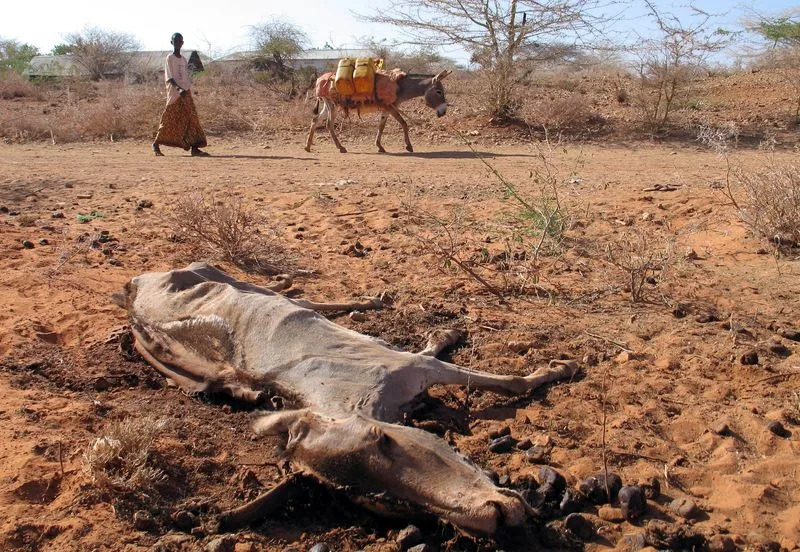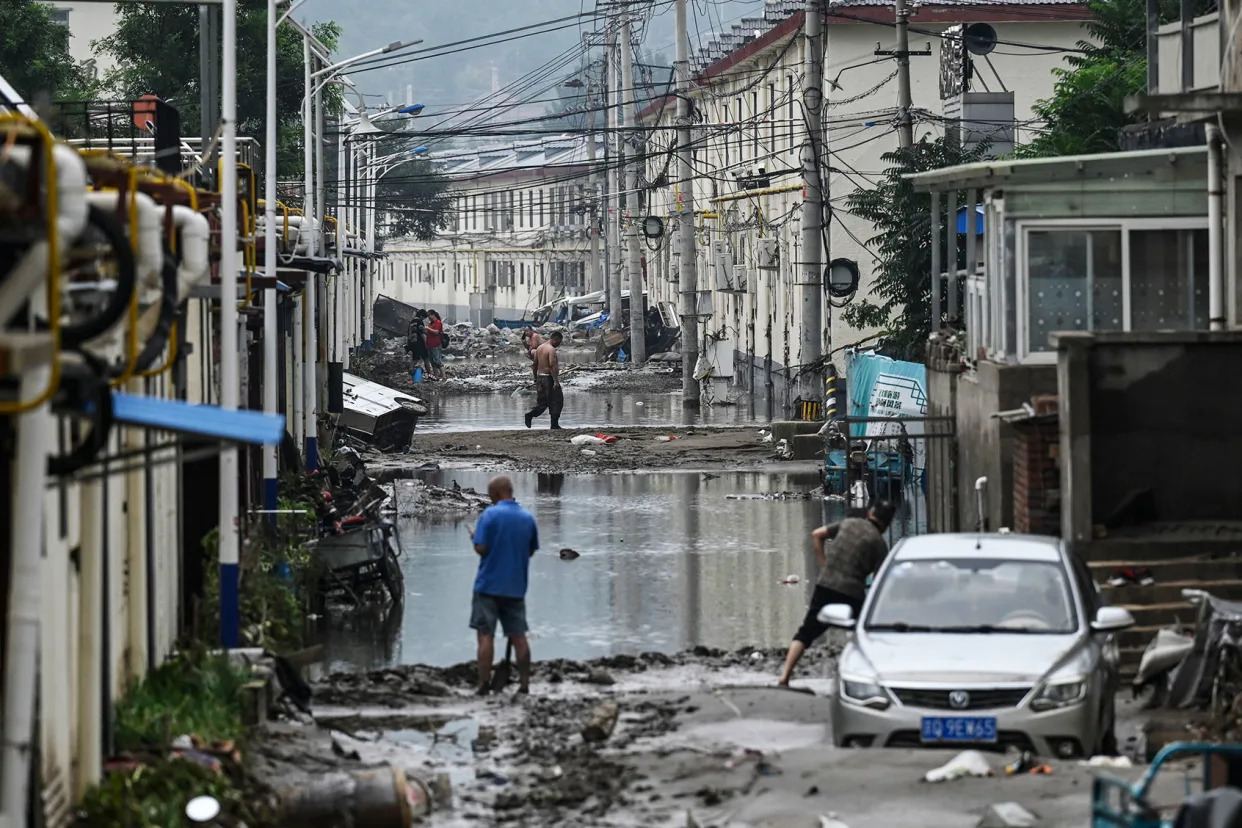Climate change may increase conflict deaths, says IMF
Wed, August 30, 2023

A Somali herdsman walks with his donkey past a carcass in Garbaharey
By Rachel Savage
JOHANNESBURG (Reuters) - Climate change is likely to worsen conflicts in fragile and war-torn states, resulting in higher death rates and greatly reduced GDP, the International Monetary Fund (IMF) said in a report on Wednesday.
The World Bank each year revises a list of countries classed as "fragile and conflict-afflicted states," of which there are currently 39, and 21 are in Africa. Wednesday's report covers all 61 countries that have been on the list since 2006.
It found that climate shocks do not cause conflicts, but they worsen existing unrest and exacerbate other underlying fragilities, such as hunger and poverty.
Deaths from conflict as a share of the population could increase by close to 10% in fragile countries by 2060, the IMF said, adding that climate change could also push an additional 50 million people in fragile states into hunger by 2060.
Even though evidence of climate change is mounting after record temperatures across the world over recent months, the political will to take action has been eroded by economic weakness.
African leaders have said richer countries should provide more money to help them adapt to climate change and transition to greener energy, given that most African countries have produced a relatively tiny share of the emissions that cause global warming.
They are expected to try to reach a unified climate negotiating position at the African Climate Summit from Sept. 4-6, ahead of the COP28 UN climate summit in the United Arab Emirates starting at the end of November.
(Reporting by Rachel Savage; editing by Barbara Lewis)
Wed, August 30, 2023

A Somali herdsman walks with his donkey past a carcass in Garbaharey
By Rachel Savage
JOHANNESBURG (Reuters) - Climate change is likely to worsen conflicts in fragile and war-torn states, resulting in higher death rates and greatly reduced GDP, the International Monetary Fund (IMF) said in a report on Wednesday.
The World Bank each year revises a list of countries classed as "fragile and conflict-afflicted states," of which there are currently 39, and 21 are in Africa. Wednesday's report covers all 61 countries that have been on the list since 2006.
It found that climate shocks do not cause conflicts, but they worsen existing unrest and exacerbate other underlying fragilities, such as hunger and poverty.
Deaths from conflict as a share of the population could increase by close to 10% in fragile countries by 2060, the IMF said, adding that climate change could also push an additional 50 million people in fragile states into hunger by 2060.
Even though evidence of climate change is mounting after record temperatures across the world over recent months, the political will to take action has been eroded by economic weakness.
African leaders have said richer countries should provide more money to help them adapt to climate change and transition to greener energy, given that most African countries have produced a relatively tiny share of the emissions that cause global warming.
They are expected to try to reach a unified climate negotiating position at the African Climate Summit from Sept. 4-6, ahead of the COP28 UN climate summit in the United Arab Emirates starting at the end of November.
(Reporting by Rachel Savage; editing by Barbara Lewis)
Matthew Rozsa
SALON
Tue, August 29, 2023

Beijing China Typhoon Aftermath JADE GAO/AFP via Getty Images
By the end of the century, nearly 1 billion mostly poor people could die due to climate change, a new study suggests. If climate change reaches 2°C higher than pre-industrial levels, the level of death it will unleash would be catastrophic, according to research published in the scientific journal Energies. If true, this means that even staying within the confines of the Paris climate accord — which pledges 2°C as the upper limit of global warming — will still lead to a humanitarian disaster.
The authors, Joshua Pearce of Western University in Ontario, Canada and Richard Parncutt of University of Graz, in Austria, performed a meta-analysis on studies that examine fatalities caused by climate change impacts. They found that "a future person is killed every time 1000 tons of fossil carbon are burned." The researchers concluded that "if warming reaches or exceeds 2 °C this century, mainly richer humans will be responsible for killing roughly 1 billion mainly poorer humans through anthropogenic global warming, which is comparable with involuntary or negligent manslaughter."
The scientists emphasized the role of wealthy humans because research shows that they are disproportionately among the so-called "super emitters," or wealthy individuals whose carbon footprint is significantly greater than that of ordinary people. "In 2019, fully 40% of total U.S. emissions were associated with income flows to the highest earning 10% of households," explained the authors of a recent study in PLOS Climate.
Climate change is "a 'new abnormal' and it is now playing out in real time — the impacts of climate change are upon us in the form of unprecedented, dangerous extreme weather events," Dr. Michael E. Mann, a professor at the University of Pennsylvania, told Salon in July.
Tue, August 29, 2023

Beijing China Typhoon Aftermath JADE GAO/AFP via Getty Images
By the end of the century, nearly 1 billion mostly poor people could die due to climate change, a new study suggests. If climate change reaches 2°C higher than pre-industrial levels, the level of death it will unleash would be catastrophic, according to research published in the scientific journal Energies. If true, this means that even staying within the confines of the Paris climate accord — which pledges 2°C as the upper limit of global warming — will still lead to a humanitarian disaster.
The authors, Joshua Pearce of Western University in Ontario, Canada and Richard Parncutt of University of Graz, in Austria, performed a meta-analysis on studies that examine fatalities caused by climate change impacts. They found that "a future person is killed every time 1000 tons of fossil carbon are burned." The researchers concluded that "if warming reaches or exceeds 2 °C this century, mainly richer humans will be responsible for killing roughly 1 billion mainly poorer humans through anthropogenic global warming, which is comparable with involuntary or negligent manslaughter."
The scientists emphasized the role of wealthy humans because research shows that they are disproportionately among the so-called "super emitters," or wealthy individuals whose carbon footprint is significantly greater than that of ordinary people. "In 2019, fully 40% of total U.S. emissions were associated with income flows to the highest earning 10% of households," explained the authors of a recent study in PLOS Climate.
Climate change is "a 'new abnormal' and it is now playing out in real time — the impacts of climate change are upon us in the form of unprecedented, dangerous extreme weather events," Dr. Michael E. Mann, a professor at the University of Pennsylvania, told Salon in July.
No comments:
Post a Comment